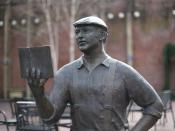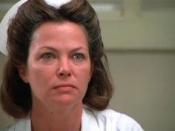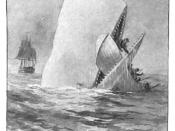1) Write a thorough character analysis of Randall P. McMurphy. Consider the following in your discussion: a) How does the narrator describe McMurphy? b) What does McMurphy say about his own background and personality? c) What do McMurphy's actions reveal about his personality? d) What do other characters think of McMurphy? e) What do you see as McMurphy's strong and weak characteristics? f) What is your own evaluation of McMurphy's rightness or wrongness?
Mr. McMurphy is described and interpreted throughout the novel as being large, thunderous, sexual active, unhygienic, and confident throughout all of his actions. He represents the sexuality, freedom, and self determination which he does not try to refute, but tries to strengthen. One could clearly see that McMurphy shows these attributes by the way he comes across to others. He is first introduced as a fearless, undaunted person ready to face his next challenge. He is considered to be a free spirit, and won't yield his energy to acclimatize to the lifestyle that Nurse Ratched would like him to embark upon.
The narrator, chief Bromden, establishes that McMurphy is not, in fact, insane, but that he is trying to manipulate the system so that it may work to his advantage. He believes that the "Combine" would be a luxury compared to the Pendleton Work Farm, where he had previously been serving a six-month sentence. McMurphy's true saneness, which is construed throughout the novel, conflicts with him being instituted into an insane institution. His true personality is revealed through his actions of selflessness. He is considered to be altruism on behalf of the others on the ward which calls one to reminisce on Christ's sacrifice of himself on the cross to redeem mankind from the corruptions and manipulations of Satan, which in the novel is represented by Nurse Ratched. McMurphy's actions often follow the actions of Christ in the Gospels. He submits himself to a baptism upon entering the ward, as Christ did when he was to begin his ministry. He slowly gathers and attracts others to him and gains his followers and intensifies the need to rebel against Nurse Ratched. When he takes his so called followers on a fishing trip, he is like Christ leading his twelve disciples to the sea to test their faith and belief in Him. Finally, as Christ suffered through His passion, McMurphy is given as the ultimate sacrifice, joint with the symbolism of the cross-shaped electroshock table and his request for "a crown of thorns," reinforces the image of the Christ-like martyrdom that McMurphy has accomplished by sacrificing his freedom and sanity. I feel that McMurphy's strength was his selflessness. He was able to look beyond what he would undergo and sacrificed his own morality for the good of his disciples.
2) Discuss Ken Kesey's choice for the title of the novel.
I believe that Kesey chose to entitle the book "One Flew over the Cuckoo's Nest" because of its symbolism. One can interpret "cuckoo" to be a person or thing absurd, strange, and not completely sane. The book's setting is in a mental institution in Oregon. The 'one' that Kesey is referring to is McMurphy, because unlike the ward, he isn't intimidated by Nurse Ratched, and he isn't scared to defy authority which he unmistakably does when he sits in front of the blank television screen waiting to watch the World Series. McMurphy proves to win his gamble by causing Nurse Ratched to lose her temper, an effort that no one could achieve but him. He demonstrates he's capability to think for himself as an individual and not as a robot, which the Chief makes comparison to everyone and everything except McMurphy.
3) Discuss the major themes of the novel.
The first theme that I would like to discuss is freedom vs. control. With McMurphy and Nurse Ratched, Kesey presents two ways of living in today's society. McMurphy symbolizes the individual who "marches to his own drummer" despite what others may think, and has no true order or discipline. Nurse Ratched, on the other hand, signifies a desire for efficiency, order, and omnipotence at any cost. An individual should have control over his own life and shouldn't be forced and deceived into doing something they really don't want to do.
The second theme is the power of laughter. The power of laughter has the power to change situations that seem depressing to something that can almost seem joyous. It has been proven to be the best medication for those who are ill, and the novel proves that. McMurphy's greatest strength comes from the way he can laugh at the world and at himself. Similar to Chief Bromden's father, McMurphy recognizes that the best way to defeat your enemies is to intimidate them by laughing at them. I belief Kesey chose to represent the degree of sanity in all the characters of the novel by their ability to laugh. In the opening scenes of the book no one can; as the book progress , one can see that the Chief's first genuine laughter in years signals he is returning to the real world, and during the fishing trip, the immense laughter the entire ward makes shows that McMurphy has triumphed over and conquered them.
The third is what is truly crazy and what is truly sane? The patients in the ward have been decreed mentally ill by society, and in many cases, by themselves. Many do show symptoms that may caused them to be labeled insane. But the diagnosis of McMurphy as psychotic contradicts the whole validity of the labeling, and during the staff meeting, Dr. Spivey and the residents show no more courage or rationality than do their patients.
The final theme is self-sacrifice. McMurphy enters the ward as a man who, despite his friendliness, thinks of no one but himself. The Chief feels that only by not having anyone to care about has McMurphy been able to escape the Combine. The Chief fully agrees with McMurphy's attitude; he too thinks it's useless to fight for anyone because the Combine will always win. Gradually, however, McMurphy sees that he's become a hero to the other patients and must act like one even at the risk of his own life.
4) Discuss the symbolism in the novel.
The fog machine is mentioned throughout the novel and represents a clouding of one's view of the world. The fog symbolizes a lack of imminence and it serves as an outlet and escape from reality. When Bromden begins to escape reality due to his fear or medication, he begins to hallucinate and believes that there is fog entering the ward and taking him away. Although the fog often seems petrifying at instances, Bromden regards it as a secure place; he can conceal himself in it and disregard reality completely. Aside from what it represents to Bromden, the fog also signifies the mental state that Nurse Ratched inflicts upon the patients with her authoritarian mentality. McMurphy signifies a new beginning. When he is introduced he slowly drags the patients out of the fog and teaches them to operate and think for themselves.
McMurphy's boxer shorts are considered a major symbol in the novel because it serves as a break through and shows him deteriorating the Nurse's ego. His shorts are black with a prototype of white whales with red eyes. They were given to him by an English major, who said that McMurphy was a symbol himself. The white whales makes one stir up memories of Moby-Dick is that the whale is a phallic symbol, a symbol that expresses when one starts to grow maturity and interest in their own sexual organs, and obviously implies that McMurphy's apparent sexuality. The diminutive whales coat McMurphy's underwear as a sign of his 'manhood' and sexuality, which he is openly proud of. Moby Dick also symbolizes the insidious evil that motivates Ahab's pursuit. In the novel, McMurphy is
similar to Moby-Dick and there is a drawn similarity between Ratched and Ahab. One may also view the comparison between McMurphy and Moby-Dick as Moby-Dick indicating the power of natural forces, showing McMurphy's uncouth and free being which contradicts with the way the institution was being ran. Concluding, Moby-Dick is related to God, which exonerates McMurphy's appearance as a Christ-like figure.
The final theme is the electroshock therapy table, which is unambiguously connected to crucifixion. It is fashioned to resemble a cross, with the straps across the forearm and head in place of a crown of thorns and nails for the wrists. Electroshock therapy served as a warning and reminder, to those who dared undermined the Combine rules, of what was their fate was to be. McMurphy, a perfect example of what true under minding was, was eventually going to be sacrificed as well as Ellis, Ruckly, and Taber.
5) Write an essay agreeing or disagreeing with the following statement: "The fundamental
opposition in One Flew over the Cuckoo's Nest is not between madness and sanity, but between being trapped and free."
I agree with the statement because the true conflict that concerns the book is the opposition between being trapped and free. The people in the Combine were dehumanized in the sense that they had no free-will. They were stripped and cheated out of their rights and individuals and forced to take on a new role as Nurse Ratched's robot. She maneuvered and caused them to think they were insane when in fact they weren't. In many cases she caused the ward mates to go insane because of her dominance. One cannot live without freedom, and when forced to, they either die physically, mentally, or spiritually. Those who were exposed to Nurse Ratched's power were killed spiritually and mentally. They no longer had an identity. The ward was trapped in Ratched's webs of lies, deceit, humiliation, and manipulation. When McMurphy is introduced he challenges Ratched's authority and shows the others that they are human beings with rights. The ward was driven to insanity because of their denied rights. They were trapped in the system and found know way of escaping without an authoritative figure equivalent or higher then Ratched. When McMurphy enters the story, he serves as the Savior in which the ward was awaiting, one who would challenge Ratched's authority. The ward was a prisoner to Ratched's demeaning ways, but most of all, they were prisoners to hope. When McMurphy appeared, the situation began to change gradually. He made them free, perhaps not physically but spiritually. They were able to find new understanding, trust, and life following McMurphy. Once one has been in confinement
for such a lengthy period, one would seek ways of escaping it and McMurphy provided that. He provided a new alternative and showed them that there were other options and that they no longer had to construct their lives in a certain manner to make Nurse Ratched comfortable or pleased. There is a drawn connection between the quote; it links itself to itself; in meaning that the opposition isn't so much madness and sanity, but being trapped and free. And when denied the right of being free, one would be likely to become mad.
6) Write an essay commenting on the following quote from Harding: "This world belongs to the strong. The ritual of our existence is based on the strong getting stronger by devouring the weak... We must learn to accept it as a law of the natural world."
I believe that this quote can be interpreted as another saying for 'survival of the fittest'. Those who long to survive will and they can only accomplish that by destroying the weak that stand in their way. The weak simply cannot survive in this world if they have no back bone to. This world belongs to the strong-minded authoritative figures such as Ratched. The strong devour the weak in order to maintain their level of superiority. They ate away at their self-confidence and self-importance. The strong diminish the weak until their integrity no longer exists. The manifestation isn't able to be seen until the last result which is their insanity. The weak allowed the enemy to steal their pride and integrity and McMurphy was the one who restored it. The strong survives upon devouring the weak. They may be powerful but once the 'savior-like' figure enters, that person or thing is seen as being more powerful then the one whom they once called 'strong'. If one chooses to accept it as a law of the natural world, then he/she is denying themselves the right of being considered strong, because by this statement, they acknowledge and admit that they are weak individuals. They accept the unfair treatment of individuals based on their ability not to be as strong another person. That mentality gives the strong more reason to devour the weak and makes the task easier when the weak admits that there is nothing that will be able to change that.
One Flew over the Cuckoo's Nest
Tingle, Tingle, Tangle, Toes
She's a good fisherman
Catches hens, puts 'em inna pens
Wire blier, linmber lock
Three geese inna flock
One flew east,
One flew west,
One flew over the cuckoo's nest
O-U-T spell out
Goose swoops down and plucks you out.


